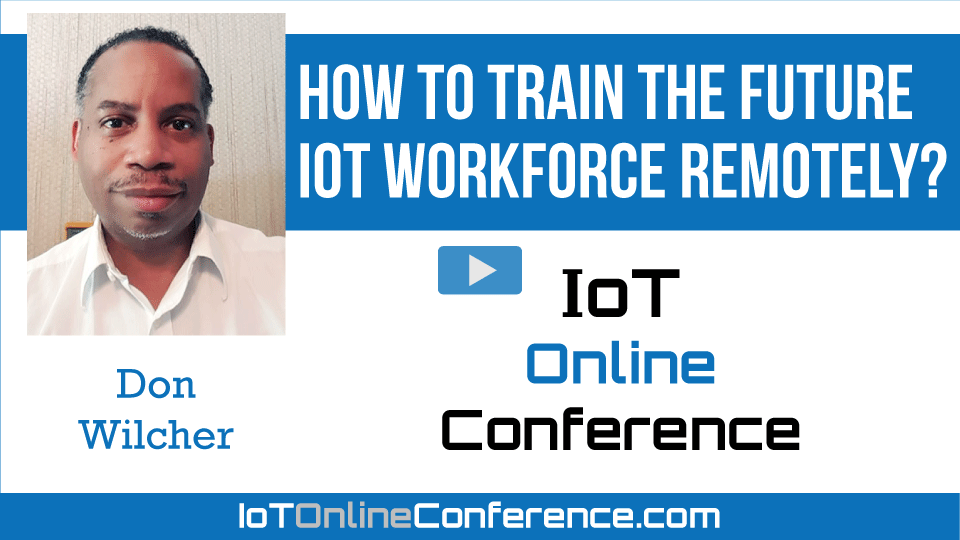2020 >
How to Train the Future IoT Workforce Remotely?
Dr. Don Wilcher- Watch Now - Duration: 01:17:23

With Covid19 impacting hands-on learning at higher education and postsecondary institutions, undergraduates and postsecondary learners have no to limited access to engineering and technical instructional labs. How can instructional training in IoT be implemented remotely? In this Virtual Talk (VT), the spending cost of IoT products and the demand for a technology- oriented workforce needed will be presented. To meet this workforce demand, instructional strategies for learning IoT technologies remotely with low cost hardware development platforms will be discussed. Also, open source software tools to aid in creating IoT applications will be presented. Further, WiFi and Bluetooth (BT) development approaches will be compared along with alignment of hardware platforms. The specific hardware platforms to be discussed in this VT will include ESP32, ESP8266, the Raspberry Pi, Arduino Nano 33 BLE/Nano 33 BLE Sense, and the BBC micro:bit. In addition, WiFi and BT application concepts for sensing and control will be presented.
I hate to give a negative review but this was disappointing! I was hoping that you would answer the question "How to train the Future IoT Workforce remotely?" but I don't think you got around to that in your 1 hour 15 minutes presentation? A list hardware and tools is NOT the answer!
Hi DaveL,
i am sorry you did not feel the talk provided the answer(s) you were looking for. Unfortunately, you missed the message of the talk which focused on the discussion of the Competency Based Instruction framework, explanation of Personal Learning and Personalized Learning Instruction, 21st IoT Century skills requirements, and research supported curriculum. The discussion on hardware and tools were to provide resources on setting up such a personal learning lab environment. Again, sorry for your disappointment in the talk.
Thank you for your response, perhaps we have a different understanding of the title? I was focusing on the terms "How To Train" and "Remotely". You outlined a set of topics that should be taught and how these would fit into a standard framework. OK, that specifies the learning outcomes. However, I did not feel that you covered "How" you are going to effectively "Train" (I would say "Teach") your students these topics "Remotely". The tools you presented would form a good basis for "homework" assignments as part of a conventional face-to-face course but what additional steps would you take to ensure this works remotely? You mentioned the "Learning Environment": Good technical training requires a lot of supervised, hands-on lab work - what is your solution to providing an effective, supervised remote learning environment?
Hi DaveL,
This talk was intended for a technical-technology audience who is looking to transition into this space. The information provided was a road map to aid in the planning as it relates to HW development platforms, electronic instrumentation resources, and a provided Personal Learning framework (PLF). The developed PLF is supported by research to aid in developing an individual educational training plan. With the audience of the conference being technical-technology professions, the material presented was to engage the participants on self-reflection and to provide research based instructional strategies to assist in their own IoT transitional personal learning journey. I agree, if this plan was for educators working in K-12, postsecondary and university learning settings, then a detail instructional plan would have been presented. DavidL, I hope this clarifies the vision and purpose of the my talk.
Hi Don,
For many years I have worked for a professional training organization running courses for hardware designers, verification engineers and embedded software developers - the same engineers who are now developing IoT devices and attending this conference. The Covid19 lockdowns and travel restrictions that have been in place for the past 9 months or so have required us (along with other training providers) to develop stategies to replace face-to-face training with remotely delivered alternatives, whilst ensuring that delegates received (as far as possible) an equivalent learning outcome. I was hoping that your presentation would enlighted us about your experiences and recommendations in this respect. This would also have been of interest to the potential audience (professional engineers) who are not always convinced that remote learning is an acceptable alternative to face-to-face training!
Never mind - I am sure your presentation would useful to your intended audience.
Best wishes for your research project - I would still want to listen if you present your results next year!
Hi DavidL,
Ok, I understand. Now that would be an interested topic to present. Hopefully, I will have such information to share and can present at next year's conference. Thank you for the great conversation and suggestion. You take care and be safe DavidL.
I find guy very informative
https://www.youtube.com/channel/UCu7_D0o48KbfhpEohoP7YSQ
Hi Carlo,
Thanks so much for the comment and for sharing the video.


Thank you for the presentation!